#40 Years of Morrissey
Text










Last Monday night at the State Theatre Sydney Australia - MORRISSEY (111223)
1 note
·
View note
Text



#40 years of Morrissey#Anfiteatro Parque de la Exposición#Bad Religion#Punk Rock#The Cure#Of a Lost World#Estadio San Marcos#post punk#New Wave#ron cartavio#cigarros pall mall#hot topic#vans off the wall#vans old school#dr martens#cervezas y chicas#pizzas y musica#Monster Energy
0 notes
Text
Idk if this is a hot take or not but I don't get The Cure's reputation of being a depressing band when The Smiths' discography is far more uniform in the absolute misery.
#The Cure has bangers and fun songs mixed in with the moody and depressing work#Robert Smith has dealt with some issues yes#but also seems to have had a massive support network from the beginning and STILL does#including what looks like a happy relationship for 50+ years now#Contrast that with the Smiths--I've listened to like 2 albums now and all of the songs are pretty dire in terms of mood#And Morrissey is so...Morrissey and he still seems absolutely miserable in spite of the ego 40 years on#Though maybe more seasoned fans would be able to give more perspective than me since I've just started to seriously listen to both bands#If I'm talking nonsense let me know I love seeing other peoples' takes on this sort of stuff
4 notes
·
View notes
Text
"I've lost my faith in womanhood" is such an incel lyric, I can see why that guy from 500 days of summer loved The Smiths. Morrissey was ahead of his time by being a volcel in the 80s.
All jokes aside, some people think the celibacy thing was a shtick to disguise Morrissey being gay or bi. Although I do think he's not a kinsey 0 at all, I don't think the celibacy was fake, and Pretty Girls Make Graves is my argument.
For me, the lyrics describe the narrator's girlfriend pressuring him into sex (give in to lust, give up to lust), and when he says no or "not right now" (I'm not the man you think I am [...] she wants it now, and she will not wait/ but she's too rough and I'm too delicate), she dumps him for someone else who will have sex with her (then on the sand/ another man takes her hand). The narrator also realizes he's weird for this decision (I could have been wild and I could have been free/ but nature played this trick on me).
I feel like if Morrissey were a tumblrina into microlabels he would probably describe himself as panromantic demisexual or something hyperspecific like that. Since he's not, he doesn't, and he called himself celibate and said he liked all humans.
Anyway, that's my armchair critical analysis of Pretty Girls Make Graves. Genius dot com hire me.
6 notes
·
View notes
Text
HAPPY 40 YEARS OF THIS CHARMING MAN. Thank you to this song for providing joy in my life and creating some of my favourite memories
4 notes
·
View notes
Text
Dear God send me a drum proficient math loving film photogenic gossippilled casual athletic pursuit tenable impressive eyebrowed youngster who likes me to proximity and convenience bond with i promise I will be a chaste man until we are married
5 notes
·
View notes
Text

1 note
·
View note
Note
((☁️)) + 10 + Pedro Pascal as Shane 'Dio' Morrissey. He's such a little rat bastard, I imagine him aged up, of course, probably after he gets out of prison? Somewhere in his 40's.
((You're so nice, wah I tried to look and couldnt find it like a dummy, so so sorry about that!))
“𝐃𝐢𝐝 𝐲𝐨𝐮 𝐦𝐢𝐬𝐬 𝐟𝐞𝐞𝐥𝐢𝐧𝐠 𝐦𝐞 𝐚𝐫𝐨𝐮𝐧𝐝 𝐲𝐨𝐮 𝐬𝐨 𝐦𝐮𝐜𝐡 𝐭𝐡𝐚𝐭 𝐲𝐨𝐮’𝐯𝐞 𝐫𝐞𝐬𝐨𝐫𝐭𝐞𝐝 𝐭𝐨 𝐲𝐨𝐮𝐫 𝐡𝐚𝐧𝐝?”
pairing: Shane ‘Dio’ Morrissey x f!Reader


warnings: 18+ you nasties. Masturbation, exhibitionism, echoes of Dio’s god complex!
dio masterlist I| main masterlist |I follower celebration I| ask |I

“F-Fuck-“ you choke out, tears welling in your eyes as you bury your hand in your panties and finally give in to the throbbing need between your thighs.
24 hours. You only had to wait another 24 hours and Dio would be home, but you’re burning for him already, desperate for some friction against your neglected clit. His parole meeting was tomorrow, and his lawyer was certain that it would be granted. Years of behavioural therapy and positive steps left the board with no choice.
The promise of his hands and lips in yours, his voice in your ear whispering what he’d do to you. His letters he sent you during incarceration were filthy— you knew he intended to keep his promises.
Whimpering softly, you rock your aching clit against the heel of your palm in the darkness. You can feel it, the creeping crescendo of your orgasm ebbing at the edges of your mind.
“So, it looks like you’ve betrayed me,” a rumbling voice sounds from the doorway of your bedroom, shocking you out of your impending bliss as you sat up quickly against the mattress. Your wide eyes fall on Dio, leaning against the doorframe and crossing his arms over his chest. He looks odd like this, without his piercings. The holes had closed back up after years without them. Grey litters his black hair, fine lines and creases by his eyes.
“I-“ you choke, and Dio raises his finger in warning.
“Did you miss feeling me around you so much that you’ve resorted to your hand? Hmm?” He coos, and you can feel your face burn under his gaze. You watch his hand drift down his sternum, palming himself through his trousers. “Parole meeting was pushed forward. Got to come home early.”
Oh…
“Well, don’t stop on my account. If you ache for me, prove it.”
#shane dio morrissey#shane dio morrissey x reader#shane dio morrissey x you#shane dio morrissey x y/n#shane dio morrissey fanfic#shane dio morrissey fic#dio x you#dio x reader#dio x y/n#dio morrissey#dio morrissey x reader#pedro pascal x you#pedro pascal#pedro pascal fics#pedro pascal x reader#pedro pascal smut#nypd blue#જ⁀➴ mail: received#✩‧₊˚ 6k follower celebration ˚₊‧✩
271 notes
·
View notes
Note
But Johnny told a different story when they went to New York. Johnny said that he and moz went to buy records and clothes. I think Morrissey is lying about it. I feel like he knows the real reason Joe Moss left, but instead of telling the truth, he acted like Moss and the rest of the band were planning to get rid of him
Are you confusing the trip they took in early 1984 with the tour in 1986? The 84 one seems very harmonious and productive, but on the later one things seems to have changed.
Some book or article refers to the Joe Moss thing (dont remember where) that he (and mike and andy) wanted the whole homoeroticism thing toned down a lot. Seems to woken some bad feelings among them that they should be so "flagrant". The song What do you see in him later became Wonderful Woman at I think Joes insistence. If he was a spokesperson for the other two or speaking for him self, i dont know.
The whole deal with the Joe Moss affair is so dufficult to judge 40 years later. The man has been dead for years and he didnt speak to the press about his time as manager. I never got a grasp of him as a person. Did he see Morrissey as a weak card in the line up? Did he just dislike him? Did he want The Smiths as a pure rock group who would appeal to the most neanderthal amongst us? Who knows. I never knew or understood why he suddenly left but I think if he meddled with artistic output, he wasnt going to last anyway.
#if he had purely been organising tours#cars concerts and so on he would probably been a good match for them as a group. they all seemed to need a mentor figure who could lead#them in a good direction. but if he wanted artistic control and control of appearances they made he probably overstepped.#it wasnt so uncommon to replace a singer or other member of a band in those days. half of manchester claims to have been a early sniths#*smiths. i could be a clash of personalities or power struggle. very hard to say. johnny rogan wrote a book about different rock managers#and their role and manager style. (i own a copy but i cant find it :() could check if he wrote anything about him there.#morrissey#johnny marr#the smiths#marrissey
25 notes
·
View notes
Text
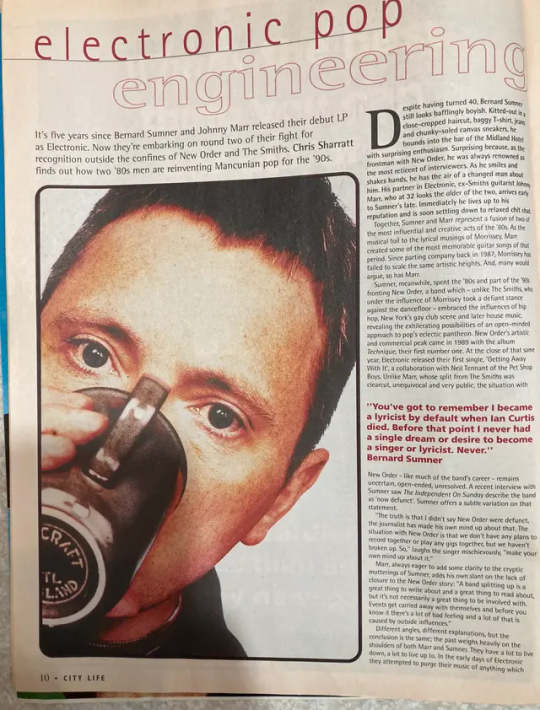
Feeling Electronic: An Interview With Johnny Marr & Bernard Sumner
Despite having turned 40, Bernard Sumner still looks bafflingly boyish. Kitted-out in a close-cropped haircut, baggy T-shirt, jeans and chunky-soled canvas sneakers, he bounds into the bar of Manchester’s Midland Hotel with surprising enthusiasm. Surprising because, as the frontman with New Order, he was always renowned as the most reticent of interviewees. As he smiles and shakes hands, he has the air of a changed man about him. His partner in Electronic, ex-Smiths guitarist Johnny Marr— who at just 32 looks the older of the two — arrives early to Sumner’s late. Immediately he lives up to his reputation and is soon settling down to relaxed chit-chat.
Together, Sumner and Marr represent a fusion of two of the most influential and creative bands of the 1980s. As the musical foil to the lyrical musings of Morrissey, Marr created some of the most memorable guitar songs of that period. Since parting company in 1987, Morrissey has failed to scale the same artistic heights. And, many would argue, so has Marr. Sumner, meanwhile, spent most of the ’80s and part of the ’90s fronting New Order, a band which — unlike The Smiths, who under the influence of Morrissey took a defiant stance against the dancefloor — embraced the influences of hip-hop, New York’s gay club scene and house music, revealing the exhilerating possibilities of an open-minded approach to pop’s eclectic pantheon. New Order’s artistic and commercial peak came in 1989 with the album Technique, their first number one. At the close of that same year, Electronic released their first single, ‘Getting Away With It’, a collaboration with Neil Tennant of the Pet Shop Boys.
“You’ve got to remember I became a lyricist by default when Ian died. Before that point I never had a single dream or desire to become a singer or lyricist. Never!” Bernard Sumner
Unlike Marr, whose split from The Smiths was clearcut, unequivocal and very public, the situation with New Order — in keeping with much of the band’s career — remains uncertain, open-ended, unresolved. A recent interview with Sumner saw The Independent On Sunday describe the band as ‘now defunct’. Sumner offers a subtle variation on that statement. “The truth is that I didn’t say New Order were defunct, the journalist has made his own mind up about that. The situation with New Order is that we don’t have any plans to record together or play any gigs together, but we haven’t broken up. So,” laughs the singer mischievously, “make your own mind up about it.”
Marr, always eager to add some clarity to the cryptic mutterings of Sumner, adds his own slant on the lack of closure to the New Order story: “A band splitting up is a great thing to write about and a great thing to read about, but it’s not necessarily a great thing to be involved with. Events get carried away with themselves and before you know it there’s a lot of bad feeling and a lot of that is caused by outside influences.”
Different angles, different explanations, but the conclusion is the same: the past weighs heavily on the shoulders of both Marr and Sumner. They have a lot to live down, a lot to live up to. In the early days of Electronic they attempted to purge their music of anything that smacked of their previous exploits. That was before they became at ease with their history. Both, after all, are well versed in dealing with their very public pasts. When The Smiths dissolved, Marr’s response was to dive into a number of collaborations — with The Pretenders, The The, Kirsty MacColl and many others — gaining a reputation as a guitar for hire. “The period between The Smiths and Electronic was a matter of being phoned up by people who I really admire and being asked to make records,” he explains.
This time it’s Sumner’s turn to dig beneath the surface of his partner’s words. “After you’ve been in the confines of a band for a while like both of us had, you want to break the mould. As soon as you get out you do everything you couldn’t do within the group. So Johnny played with a load of different people because he couldn’t with The Smiths. I did a lot of remix work. It’s like with the first Electronic album [released June ‘91]: we put our photographs on the album cover because you couldn’t do that [before]. It was a phase we went through. But now Electronic is the main thing for us.”
For Sumner, of course, his whole career as a singer has been a case of shaking off and living up to the past. When Joy Division singer Ian Curtis committed suicide in May 1980 it left Sumner, the band’s guitarist, not only personally distraught but professionally cast adrift. After deciding to continue as a band and adopting the name New Order on the suggestion of their manager Rob Gretton, someone had to take over as singer. Sumner, a man who maintains that he had never written so much as a childhood poem beforehand, got the short straw: “You’ve got to remember I became a lyricist by default when Ian died. Before that point I never had a single dream or desire to become a singer or lyricist. Never!”
“The two of us expect a lot of ourselves and we just cut out the outside world while we were making the album.” Johnny Marr
Sumner’s lyrics have always been a matter of much scrunity, whether it be to ridicule them — lines like, “I would like a place I can call my own / Have a conversation on the telephone” from New Order’s sublime ‘Regret’ have provoked scorn from detractors — or to celebrate their quite touching ambiquity or autobiographical honesty. But Sumner maintains a quite workmanlike approach to the craft — lyrics, he explains, are written after hearing the finished music, and fitted in accordingly.
“Generally I don’t think, ‘Right, I’m going to write a song about this’. I listen to the music and I’ll see what it suggests to me. And lines or pictures — I’ve always thought in pictures — will pop into my head. If it’s a picture I’ll describe the scene.” Sumner is surprisingly self-critical of the results of this process. “Some of the changes in direction in my lyrics aren’t always welcome, sometimes I get it wrong,” he says, “but I write a lot of lyrics through a kind of subconcious flow.”
Still, despite this playing down of his lyrics — he says he finds it difficult to talk about them — last year Sumner was picked as a songwriter worthy of study by the psychologist Oliver James. In a BBC 2 programme, James sought to assess how the anti-depressant wonder drug Prozac affected creativity. Sumner was one of several participants, from artists to writers, who were put under the spotlight. Consequently the BBC cameras showed Sumner both at work in the studio putting together the new Electronic album as well as relaxing with his girlfriend and family.
“This quy from the BBC came to me and said, ‘Would you like to take Prozac? We’re doing an investigation into its effects on creativity.’ His theory was based on the idea that creative people were creative because basically they were fucked-up in some way, and he wanted to test out his theory, ie, you get all these people who are somehow fucked-up — and he obviously thought I was fucked-up in some way — you give them Prozac, they stop being fucked-up, does their creativity dry up? Which is very interesting.”
And? “I’m not fucked-up, I’m like everybody else; I have my up days and my down days. I found taking Prozac very interesting ‘cos it filtered out all the lows. I didn’t find that it affected my creativity in any way at all.”
Both Sumner and Marr were unhappy with the programme’s conclusions — Sumner was described as being depressed and suffering from ‘hyper-critical voices’. But the subject of Prozac does have relevance to the new Sumner, a man for many years renowned for his passionate embracing of Manchester’s nightlife and drug culture. These days he says he goes jogging every day — “It sharpens the mind” — and is cutting down on alcohol after stomach problems aggravated by an excessive intake of Pernod and orange (although he adds with a smile that he’s cured the ailment, so he can now get back on the Pernods). These lifestyle changes, partly the actions of a man coming to terms with his age, have a direct relevance to how Electronic make their music.
“It used to be a party ethic, now it’s a work ethic. We’d stay up all night and party and that’s how we’d come up with songs,” explains Sumner, describing a way of working which stretches back to both New Order and Joy Division. “But we’ve done that, and this is more challenging and more rewarding because you’re in the driving seat!”
Adds Marr: “It wasn’t that we weren’t getting results that way, we just wanted to do something different.”
In the past, most of Sumner’s lyrics were written under the influence of one stimulant or another, aiding the “flow of conciousness”. So how does the all-new Mr (nearly) Clean write his lyrics? “What do I do now? I sit in a fuckin’ room and beat my brains out,” laughs Sumner.
It doesn’t show. The new Electronic album, Raise The Pressure, is a finely-polished, well-balanced pop album, which, despite both Marr and Sumner’s claims to the contrary, has clear referance points to their work with The Smiths and New Order, particularly the latter. Their obvious desire to break from their musical pasts is wholly understandable, yet their inability to do so is not altogether a cause for concern. Raise The Pressure may bear some of the hallmarks of their ‘80s incarnations, but it sounds well-placed for the current pop climate, with its sparkling combination of guitar-pop and electronic house-inflected dance. Two years in the making, it is quite obviously a record constructed by perfectionists.
“All Bernard and I have cared about over the last few years is Electronic and our families, and the balance has shifted towards Electronic,” explains Marr. “That’s been our life. The two of us expect a lot of ourselves and we just cut out the outside world while we were making the album.”
“Ian Curtis turned me on to Kraftwerk in 1977 and when he did I thought it was the most fantastic thing I’d ever heard.” Bernard Sumner
Recorded in a studio in Johnny Marr’s old house — he moved his family into a new house because “it was easier to move my family out than to move Electronic. It just really suited us” — Marr explains that “we kind of designed the record.” Part of that design involved bringing ex-Kraftwerk stalwart Karl Bartos into the creative equation. He co-wrote some of the tracks and assisted with production. For Sumner, working with Bartos was another direct link to his musical past, taking him back nearly 20 years. “Ian Curtis turned me on to Kraftwerk and when he did I thought it was the most fantastic thing I’d ever heard. You’ve got to remember it was 1977 and everything was punk. Ian played me Trans Europe Express, which was like the total opposite, black and white.”
On the few occasions when Marr and Sumner emerged from the self-imposed isolation of their home-studio, they took Bartos on visits to ‘Flesh’ at the Haçienda, the pinnacle of gay clubbing in Manchester — “Which was interesting,” smiles Marr. All part of the Electronic masterplan, a plan which saw them whittle down 40 pieces of music to 16 songs, 13 of which appear on the new LP. The managing director of their label Parlophone claimed recently: “They don’t need our help to make an album, although we had to put a marker down otherwise they might have gone on forever refining it.” Fair comment?
“That’s bullshit that,” smirks Sumner. “No-one put down any markers.”
“What, someone from the record company said that?” laughs Marr incredulously.
“Neither of us have ever dealt with A&R people in our lives,” asserts Sumner.
The pair say they have total freedom to get on with making records as and when they want. And despite moving from the fiercely Mancunian and fiercely independent Factory for their first album to the London-based major Parlophone (part of EMI) for their second, nothing much has changed. “For us the situation is no different than when we were on Factory,” says Sumner. “During the whole two years we never saw anyone from Parlophone. In fact, I don’t think we’re actually signed to any record label. We’re signed to our production company which then licences product to Parlophone.”
“‘We finance everything ourselves because we want to keep control of everything,” adds Marr. “We take care of the sleeves, we just deliver the whole thing to Parlophone and they sell it.”
This desire to maintain their independence is closely guarded, and is reflected in their continued strong links to Manchester, despite both having good reason to have broken their connections with the city. Originally from Ardwick, Marr saw his childhood haunts demolished to make way for new developments when his family was shipped off to Wythenshawe. Sumner’s Salford childhood was disrupted in a similar way, and the dislocation felt following the flattening of the terraced street he grew up in still surfaces today, the song ‘Second Nature’ on the new LP being an autobiographical appraisal of that early experience.
“We’ve got an office in London [they are managed by Marcus Russell, Marr’s manager since 1988 and now also looking after Oasis] but we hardly ever go there,” says Marr. After touring the world with both of their previous bands, it seems that Electronic are happiest when back home. And as with New Order, whose unconventional approach to promotion surely stopped them becoming U2-style huge, it could prove an obstacle to Electronic’s progress. Despite claiming that they will be playing live to promote Raise The Pressure, long tours are out of the question, says Sumner. “I don’t want to do 28 dates in America and end up in Kansas on a Sunday night, pulling my hair out and wanting to be in Manchester.”
Welcome home, Electronic.
#bernard sumner#johnny marr#electronic#text#1996#interview is just copy/pasted w/ minor edits for clarity - source w/ full text is linked!
39 notes
·
View notes
Text
Today is the 40-year anniversary of my favorite album, The Smiths S/T. I can hardly chip away at the marble of its significance to me. If I were to make a case for why art is important, this music would comprise most of that document. One day, I was very lost, and my concept of what existence means had been destroyed. This album was there to remind me that I am not inhuman. In fact, I'm the most human. The things I experienced were ancient. With the words in this record's sleeve, I am not alone. Thank you, morrissey, for writing reel around the fountain. While I wasn't approaching death, I do feel that these songs saved my life
15 notes
·
View notes
Text










Last Sunday night at the State Theatre Sydney Australia - MORRISSEY (101223)
#StateTheatreAu#morrissey#moz#meat is murder#state theatre au#the smiths#morrissey official#40 years of Morrissey
1 note
·
View note
Text
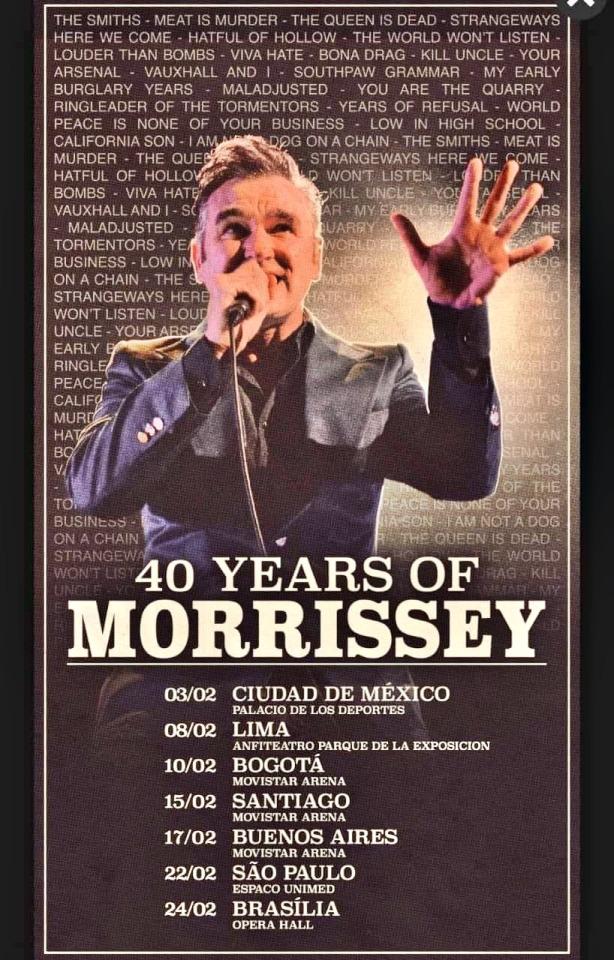


#40 Years of Morrissey#the smiths#brit pop#Bad Religion#anfiteatro del parque de la exposicion#Ville Valo#Him#Love Metal#heavy metal#cigarros pall mall#ron cartavio#hot topic#vans off the wall#vans old school#dr martens#cervezas y chicas#pizzas y musica#monster energy
0 notes
Text
2 minute read
Women’s private pension pots in Great Britain are typically worth 35% less than those of their male colleagues by the time they reach 55, according to the first major government study into what has been termed “the great gender pension chasm”.
Having analysed the data for both sexes between 2018 and 2020, government researchers concluded that on average for every £100 accumulated in men’s private pensions, women have just £65. Women could end up losing out on thousands of pounds of retirement income as a result of the imbalance.
Lower overall earnings, time off for childcare and other caring duties, and the greater numbers of women doing part-time work, are all thought to be factors in why women’s pension pots grow to just two-thirds the size of men’s.
Although several reports have been published in recent years on the topic of the gender pensions gap, this is the first time that the government has calculated the true scale of the problem.
Researchers found that the gap varied for different age bands and was lowest for people in their 30s, suggesting time off for childcare is a big factor.
For workers eligible for automatic enrolment, the gap is smaller and stands at 32%. Overall the gap rises to 47% for those aged 45-49.
The study also uncovered a gap in contributions made by men and women. In 2021, about £52bn was paid into the private pensions of women eligible for automatic enrolment compared with £62.6bn into men’s pensions – a gap of 17%.
Helen Morrissey, the head of retirement analysis at Hargreaves Lansdown, described the 35% figure as “less of a gap, more of a gaping chasm”. “The government recently announced childcare reforms which should help more women keep working and contributing to their pensions, but the gender pension gap looks set to remain with us for some time yet,” she said.
Laura Suter, head of personal finance for investment platform AJ Bell, said the figures showed that once women hit their 40s, they dropped behind men in their pension savings.
“A lot of this will be due to women taking career breaks to have children, working part time around caring responsibilities or the gender pay gap meaning they earn less – which all filters through to lower incomes and lower pension contributions.”
The figures do not include those people who have no pension wealth when they hit retirement age, which Suter says would make the gap even larger as women are more likely to have no pensions than men.
21 notes
·
View notes
Photo

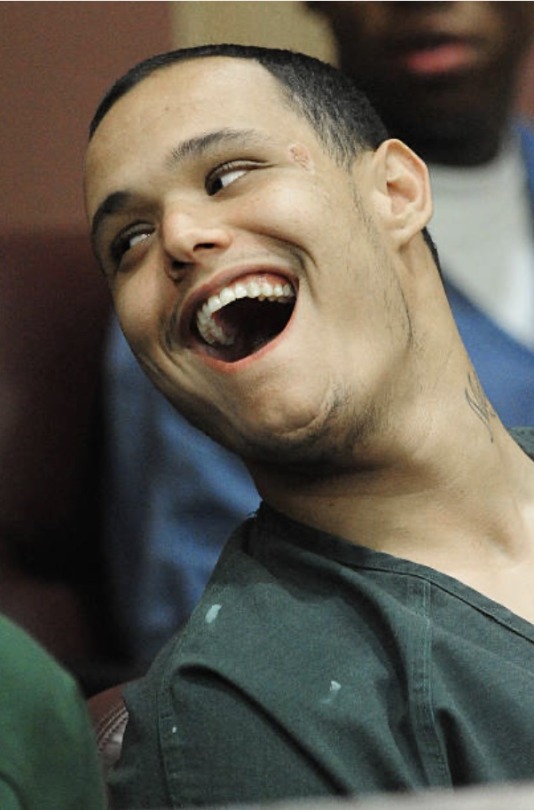
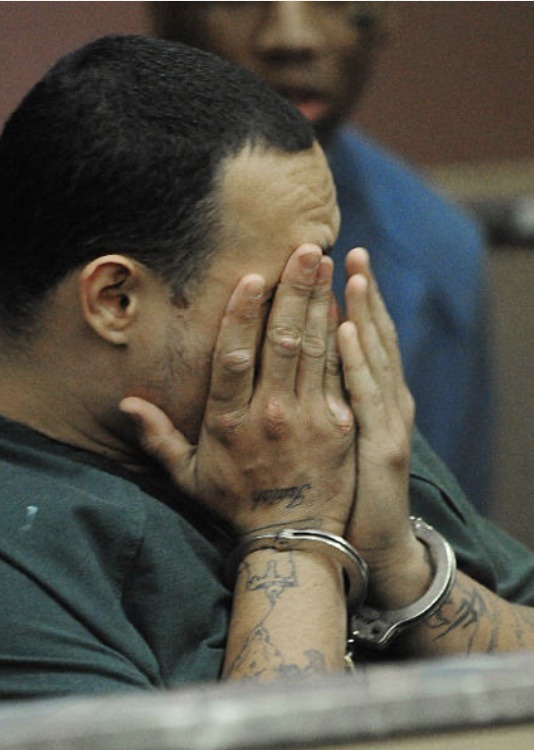
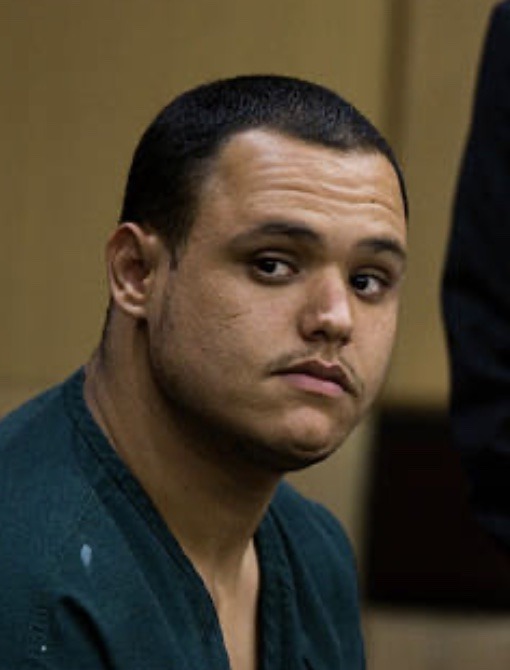
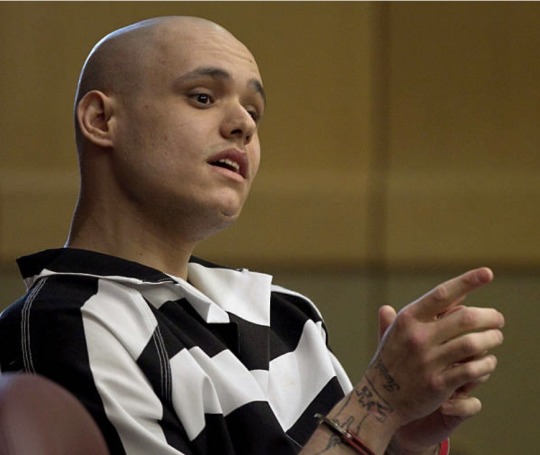
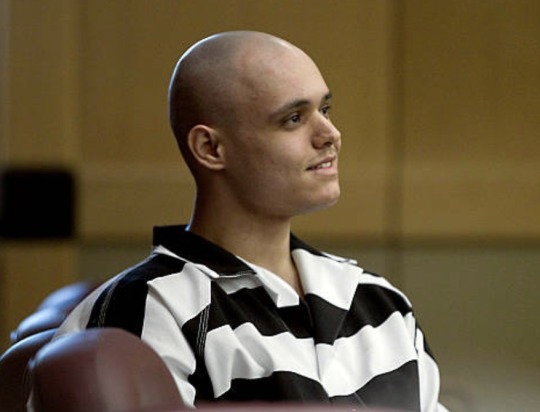
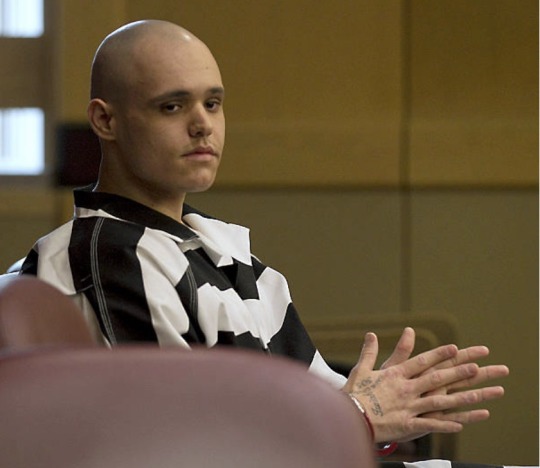
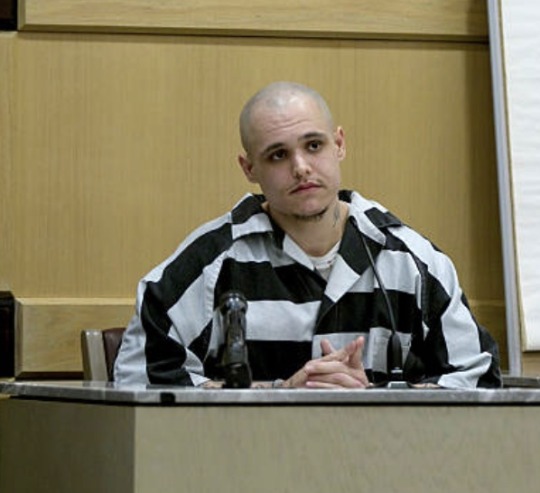
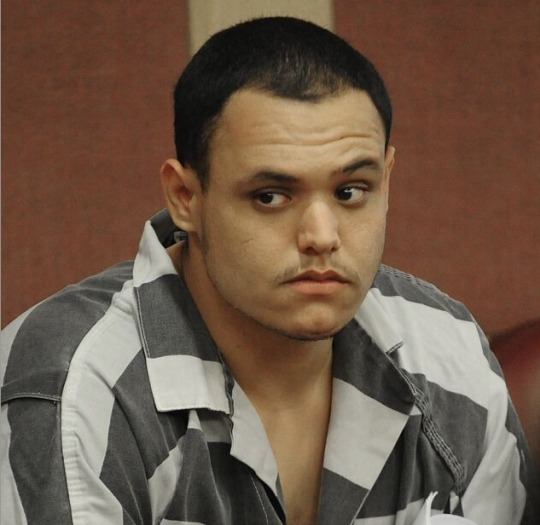
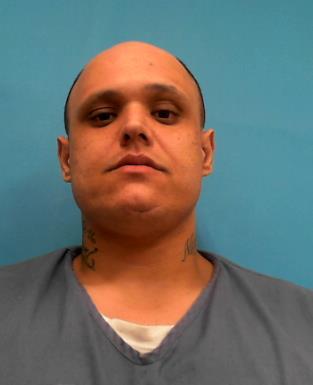
Post 950
Randy H “Junior” Tundidor, Florida inmate L75549, born 1988, incarceration intake in 2013 at age 24; scheduled for release 08/12/2047
Murder - 2nd degree, Attempted Murder - 1st Degree, Kidnaping, Burglary, Robbery, Arson
A beloved father and Nova Southeastern University professor was stabbed to death. His wife and young son escaping death from their home that had been torched.
Randy H. Tundidor, had testified against his father, Randy W. Tundidor pinning the actual stabbing on him. In exchange prosecutors took the death penalty off the table and downgraded Tundidor Junior's charge to second-degree murder.
Tundidor Junior was sentenced to 40 years in state prison. It was not the outcome the victim's family or the suspect's family expected.
Morrisey's widow, Linda had made an emotional plea in court arguing for the maximum sentence of life in prison without the possibility of parole. She said that the crime had shattered her sense of safety and that she and her son will forever live in a life in prison of the "voices of that night, the smells and noises."
For his part, Tundidor, Jr. apologized for his actions.
"If I could have stopped him, I would have," Tundidor said. "I'm truly sorry. I know it's not gonna mean anything but I'm sorry."
Earlier this year, Tundidor Jr. laid out his side of the story to a Broward County jury. He said it all started two years ago when his dad called him and asked if he knew anyone that could scare his landlord because he was being evicted and Morrissey was destroying the family. Tundidor Jr. said he would do it.
Tundidor Jr. testified that he tied up Morrissey and his wife Linda, spoke to his father by walkie-talkie, and was told to search for anything of value. He also said he had on latex gloves and had a gun but told his dad he wasn't going to shoot anybody.
When asked why they used walkie-talkies, he said it was because his dad told him "If they used a cell phone, they could be tracked." He also said he covered the Morrissey's heads with towels, "because he didn't want them to see his dad because he knew they would recognize him."
During the crime, the Morrissey's were forced at gunpoint to drive to an ATM and withdraw cash.
"It was dad's idea to get money from the ATM," said Tundidor Jr. He went on to describe the trip and said Linda withdrew the cash because her husband was driving. Linda then gave the cash to Junior.
When they arrived back at the Morrissey's Plantation home, he said he tied them up again with plastic ties and covered their heads with towels. He claimed his dad tried to find more stuff to steal. They found two laptops and he gave his dad the $500 cash from the ATM.
At this point, with the Morrissey's tied up in the bedroom, Tundidor Jr. said he wanted to leave. His dad refused and reportedly said Joseph Morrissey "has to die."
The younger Tundidor claimed that he told his dad he didn't want to be involved in that, but his dad ordered him to retrieve Mr. Morrissey from the bedroom. The son testified his father put the gun to Morrisey's head, but that it jammed. Tundidor Sr. then grabbed a knife and stabbed Morrisey twice, according to the son's testimony.
The son said Tundidor Sr. poured gas around the living room and kitchen and lit it on fire. Morrisey's wife Linda and her son both were able to escape the home.
Tundidor Sr. continues to say he is innocent of all the charges.
Tundidor Jr.'s attorney said that Randy has hope after the sentence was handed down Friday.
"He's going in with a good attitude," said defense attorney Patrick Rastatter. "He going to see light at the end of the tunnel and it's not a train coming towards him."
Tundidor Senior (Florida inmate L97205 was sentenced to death.
3u
15 notes
·
View notes
Text
Maybe I'm putting too much stock in youtube comment sections, but when people say Morrissey wasn't actually celibate and it was a cover for being gay or bi, they seem to imply he should've just come out already. They assume non-straight people would just have been fine if they had came out. Were there gay people in pop music in the 80s? Of course there were, but a lot of them weren't out. George Michael only came out in '98, and Freddie Mercury NEVER officially came out. And the musicians that were out were massacred by the media; this was during the AIDs crisis and during the Reagan/Thatcher era.
Morrissey was already being slammed by the British press either for being a foppish queen or for being an arrogant prick. It's delusional to think the media would have stopped harassing him about not having sex if he had admitted to having sex with men.
Overall this shit doesn't matter, it was 40 years ago, but I do think it's emblematic of how people still treat pop stars today. People insist Taylor Swift is secretly bi, or accuse Harry Styles of queerbaiting, or accuse Lady Gaga of being a fake bi, or ship K-pop idols with each other. With whom, where, when, why and how celebrities have or don't have sex is none of our business, and it's homophobic to demand they tell us if the answer to "with whom" is someone of the same gender.
4 notes
·
View notes